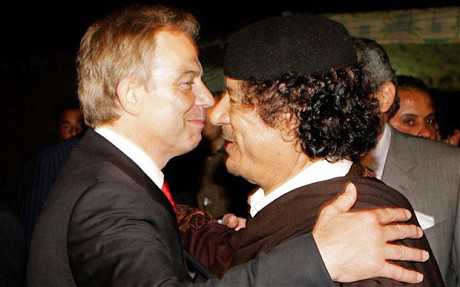Former Prime Minister Tony Blair channelled millions of pounds through a complicated web of companies and paid just a fraction in tax, The Sunday Telegraph can reveal.

By Robert Mendick, Chief Reporter
Official accounts show a company set up by Mr Blair to manage his business affairs paid just £315,000 in tax last year on an income of more than £12 million. In that time, he employed 26 staff and paid them total wages of almost £2.3 million.
The accounts provide the strongest evidence yet of the huge sums generated by Mr Blair through his various activities since quitting Downing Street in June 2007.
He runs a business consultancy – Tony Blair Associates – which has deals with the governments of Kuwait and Kazakhstan among others and is a paid adviser to JP Morgan, an American investment bank, and to Zurich International, a global insurance company based in Switzerland. Mr Blair makes a further £100,000 a time from speeches and lectures while also presiding over a number of charities including a faith foundation.
Mr Blair has previously been criticised for cashing in on contacts made in Downing Street and these accounts will likely add to those concerns.
The documents also reveal that in the two years until March 31 last year, Mr Blair’s management company had a total turnover of more than £20 million and paid tax of about £470,000.
The scale of Mr Blair’s finances are shown in accounts lodged by Windrush Ventures Limited, just one of a myriad of companies and partnerships set up by the former prime minister. Windrush Ventures Ltd’s “principal activity” is the “provision of management services” to Mr Blair’s various other interests.
The accounts for the 12 months to March 31 were lodged with Companies House in the week between Christmas and New Year and made publicly available for the first time last week. Previously the accounts have contained almost no information because Windrush was classified as a small company. This time auditors appear to have been obliged to divulge more information because of the amount of money being handled.
The accounts show a turnover of £12.005 million and administrative expenses of £10.919 million, leaving Windrush Ventures with a profit of just over £1 million, on which Mr Blair paid tax of £315,000. The tax was paid at the corporate tax rate of 28 per cent.
Of those expenses, £2.285 million went on paying 26 employees at an average salary of almost £88,000. Windrush Ventures also pays £550,000 a year to rent Mr Blair’s offices in Grosvenor Square, a stone’s throw from the US embassy in Mayfair in central London and a further sum of about £300,000 on office equipment and furniture. But those costs amount to a little more than £3 million, meaning almost £8 million of “administrative expenditure” is unexplained in the accounts.
It is not known from the accounts what happened to that huge sum.
Tax specialists who have studied the accounts have told The Sunday Telegraph that the tax paid in 2010 of £154,000 and £315,000 in 2011 appears low because costs have been offset against the administrative costs, which remain largely unexplained.
One City accountant, who did not wish to be named, said: “It is very difficult to see what these administrative costs could be. It is a very large amount for a business like this. I am sure it is legitimate but it is certainly surprising.
“The tax bill of £315,000 is explained by the large administrative costs that are being treated as tax allowable.”
Richard Murphy, a charted accountant who runs Tax Research LLP and has studied Mr Blair’s company accounts, said: “There is about £8 million which we don’t know where it goes. That money is unexplained. There is no indication at all why the administration costs are so high. What has happened to about £8 million which is being offset against tax?”
There is no suggestion that Mr Blair’s tax affairs are anything other than legitimate. His accounts are audited by KPMG, one of the world’s biggest accountancy firms. Mr Blair presides over 12 different legal entities, handling the millions of pounds he has received since leaving office. Another set of companies, which are run in parallel to Windrush Ventures, are called Firerush Ventures and appear to operate in exactly the same, oblique way.
The money paid into Windrush Ventures Ltd largely comes from Windrush Ventures No. 3 Limited Partnership, which appears to be where money is deposited before being spread around other companies, ultimately in Mr Blair’s ownership. The limited partnership does not have to disclose publicly any accounts allowing its activities to remain secret.
Mr Murphy said last night: “It is in the limited partnership where things really happen. But that is the one Mr Blair keeps secret. We don’t know how much money is in the LP. It is completely hidden. The question is why is Tony Blair running such as a completely secretive organisation?”
A spokesman for Mr Blair said last night: “The Windrush accounts are prepared in accordance with the relevant legal, accounting and regulatory guidance. Tony Blair continues to be a UK taxpayer on all of his income and all of his companies are UK registered for tax purposes.”
The spokesman added that the accounts did not relate to any of Mr Blair’s charitable activities, which raised money separately as independently registered charities.
The spokesman chose not to explain what happened to about £8 million of administrative expenses.
www.telegraph.co.uk, 07 Jan 2012

